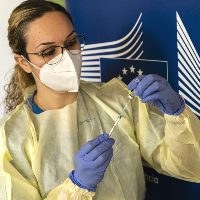(BRUSSELS) – The EU Ombudsman called Tuesday for greater transparency and public scrutiny at Europe’s disease prevention agency, as part of a wide-ranging enquiry into how EU institutions responded to the pandemic.
Following a six-month inquiry into the performance of the European Centre for Disease Prevention and Control (ECDC) during the COVID-19 crisis, the European Ombudsman has made a series of proposals to enable greater public scrutiny and understanding of its work as the crisis continues and the focus of that work moves to the monitoring of vaccine distribution.
The Ombudsman has also suggested that EU legislators reflect on whether new powers for the agency are needed to improve its capacity to deal with similar future public health crises.
The inquiry, part of a wider monitoring by the Ombudsman of how EU institutions responded to the pandemic, examined how the ECDC gathers information, the transparency of that information and how it communicates with the public.
At critical points in early 2020, the ECDC gave positive assessments of the capacity of Member States to cope with the crisis. These assessments quickly became outdated as the EU moved from ‘containment’ to a ‘mitigation’ phase.
“The ECDC’s mandate prohibits it from independent data collection, thereby significantly limiting its capacity to assess, advise and communicate when speed of response was crucial.”
“Too often, national authorities struggled to report complete data to the ECDC or did not even answer its appeals for important data. It also had no comprehensive set of data on hospital and other critical medical resources across the Member States,” said Emily O’Reilly.
The Ombudsman’s inquiry also found gaps in the ECDC’s transparency practices. Not all surveys it conducted in the early stages of the COVID-19 pandemic were made public. It is also difficult to see whether assessments on aspects of the pandemic have been updated. In addition, exchanges with international partners, for example the Chinese CDC, are not made public.
“Transparency and accountability should be the bedrock of an institution that has a role in protecting public health. Much more should have been done to communicate with the general public to explain how and on what scientific evidence the ECDC made its assessments. Crises not only require extraordinary responses from public administrations but also extraordinary efforts to maintain public trust.”
Based on the inquiry, the Ombudsman’s proposals for improvement include greater transparency on the evolution of its risk assessments, on the completeness of the data underlying its risk assessments, and around its interactions with international partners such as the WHO and the Chinese CDC. Also a revised communication strategy more directly aimed at the general public, and systematic publication of survey results.



